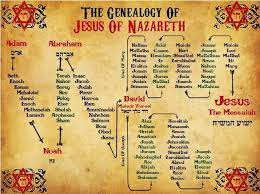HOMILY ADVENT DEC 17th
The Blessing of Our Genealogies
(Gen 49:8-10; Ps 72; Mt 1:1-17)
***************************************
Are there any skeletons in your family’s closet?
Today’s readings can help us relax and trust that God can work marvels even with a less than holy family tree.
 Today we read the opening lines of Matthew’s Gospel—the first words one reads in the New Testament, written for a Jewish audience. They are a listing of the genealogy of Jesus, the forty-two generations, three sets of fourteen, that stretch from Abraham to Christ.
Today we read the opening lines of Matthew’s Gospel—the first words one reads in the New Testament, written for a Jewish audience. They are a listing of the genealogy of Jesus, the forty-two generations, three sets of fourteen, that stretch from Abraham to Christ.
What we see in the gospel of Matthew is Jesus’ ancestral tree, showing the humanity of Jesus. We may not be biologically related to any of these men and women, but that doesn’t change the fact that we have been grafted into the body of Christ. Jesus is our brother, and we are now part of his family. That means his past is our past as well.
According to The Word Among Us, that means we have a heritage of deep and profound faith, like that of Abraham, Jacob, Joseph and Mary. We can recall their stories, marvel at their faith and celebrate their lives as we would the memories of our grandparents. We may also want to celebrate the fact that their faith flows in us – they can teach us how to believe in and trust in God.
We also have a family tree of mercy. Like any family tree, this one has some surprises. The genealogy names five women who all had children in “irregular” situations – Tamar, Rahab, Ruth, Bathsheba, and Mary. Jesus’ lineage, like the Church’s, is far from pure. Rahab, a prostitute living and working in Jericho, came to faith and became a forebear of Jesus. Are there people who feel like Rahab? Who think that their whole lives have been sunk in sin? Well, the Messiah came forth from Rahab the prostitute, and he was pleased to be her relative.
Ruth was not an Israelite but rather a Moabite, a foreigner. Some may feel like outsiders, not part of the “in” crowd, looked at askance by others. Well, the Messiah came forth from Ruth the foreigner and was pleased to be her relative. Even King David had a checkered history. but God’s mercy was big enough to cover them all, and it is big enough to cover us as well.
As the Word who dwelt among us, Jesus was part of a family that, like most, was fairly dysfunctional—a mix of the good and bad. The good news of Christmas is that God himself pushed into the dysfunctional and ambiguous family of man, and can turn what seems to be a dismal past into something bright and promising for the future.
What is our story? Today many people are interested in DNA-based ancestry tests. We like to know where, and from whom, we come from. It is fascinating to see how our story links up with historical events, and if our DNA reveals some unexpected plot twists or links to people we never expected.
Of course, the story doesn’t end with us. It keeps unfolding in our children’s lives and in the people we touch. We belong to a never-ending inheritance of grace as part of the family of God.
We are also especially part of Jacob’s family mentioned in the first reading, and the blessing he imparts on his sons, especially Judah, who receives this special blessing: “The sceptre shall not depart from Judah, nor the ruler’s staff from between his feet, until tribute comes to him; and the obedience of the peoples is his.”
We know, through both hindsight and the eyes of faith, that the sceptre and ruler’s staff refers to Jesus, the long-awaited Messiah, who is now our brother. That blessing of Jacob is also part of our family tree, and how great is that?
The Eucharist is our faith family meal passed down to us through two millennia of time that has sustained our ancestors and offered them forgiveness and healing over those centuries. May our celebration today help us to see how the mercy of our God can use all of what we do and say, even our failings and sins, to build God’s kingdom and give glory to God.



